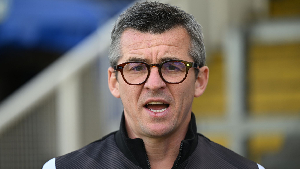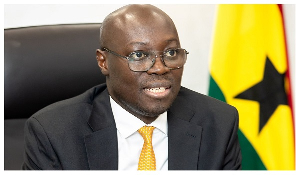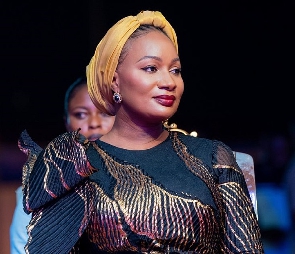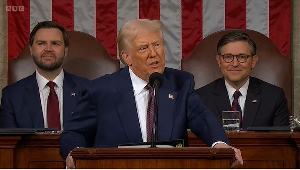Accra, Aug. 23, GNA - The five-year term of office of Professor Kwabena Frimpong-Boateng, Chief Executive Officer of the Korle-Bu Teaching Hospital will end by September 15.
The Chief Executive, who is aspiring to become the next president of the country, said he would make his handing over notes to the Board of the hospital by next month and proceed on leave prior to the end of his stewardship.
Addressing the media in Accra on Wednesday, Prof. Frimpong-Boateng reviewed his five-year stewardship and said though he would pursue his political ambition, he would continue with his work as the head of the National Cardiothoracic Centre and the Ghana Heart Foundation and lecture at the medical school.
He said his farming activities and the manufacturing of bio diesel would also continue.
He noted that taking over Korle-Bu, the biggest Teaching Hospital in West Africa and the second in Africa after Soweto as the Chief Executive in June 2002 had been more challenging because "one needs to take difficult decisions, especially when you are dealing with human lives as well as workers with different attitudes". He said the teaching hospital, established in 1923 had seen tremendous developments over the past five years with new departments being established and dilapidated buildings renovated. Outlining his achievements, he noted that the whole of Korle-Bu had been fenced to protect the properties of the hospital, a new logo had been designed as well as the introduction of a newsletter, a day care unit for haematology department, the acquisition of a new MRI from the HPIC fund to serve the sub-region, a site for a Neuroscience as well as a Urology Centre.
Other developments are the new Laparascopic surgery machines to undertake surgeries without a major cut, a new endoscopy unit, new audiology department to assist people with hearing disabilities, 16 new dialysis machines, improved housing conditions for staff and the assistance to staff to acquire plots for staff at Oyibi. He said almost all the underground power lines, which were rotten had been restored at a cost of about three billion cedis, while another 600 million cedis had been spent on the sewage system of the hospital. Management, he said had also acquired and installed a generator to serve the whole hospital in the face of the interrupted power outage in the country.
Prof. Frimpong-Boateng said those achievements had been possible because he had good management team to work with, a dedicated staff, inputs from the media in the area of criticism and the fact that there were no interference from government.
He urged the media to continue with its criticisms to put the management and government on its toes for effective developments and decisions for the enhancement of the nation.
He expressed regret that Ghana had to import almost everything "right from toothpick to the helicopter, adding that supplies like gauze, cotton wool and others used in the hospitals were imported and called for Ghanaians to have an attitudinal change to attain the development that the country required. The CEO said most of the projects undertaken by the hospital were from its Internally Generated Funds with some support from government and donors.
He commended the staff for their hard work and contribution in achieving his dream of making the hospital a centre of excellence and called for more financial support from government and donors to complete the other outlined projects.
"Great institutions are difficult to build, easy to destroy and impossible to repair", he said. He said littering of the hospital by clients, inadequate housing for staff living outside the hospital, non-payment of bills by patients, dilapidated flats and bungalows, staff shortage, transportation and negative attitudes of staff were still some challenges facing the hospital that the next Chief Executive would have to battle with and resolve.
Prof. Frimpong-Boateng noted that there were certain departments that should be turned into hospitals and cited the Maternity, the eye and children's blocks as some of the departments that should be on their own. He said a new National Blood Bank would soon be established at the Ndafar Park just behind the Hospital to the serve the entire country and asked Ghanaians not to make the hospital a first point of call but as a referral, as well as a training institution. 23 Aug. 07
General News of Thursday, 23 August 2007
Source: GNA
















